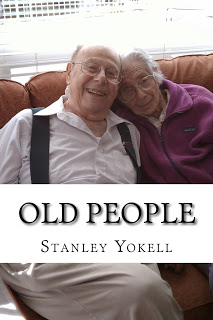
The first story, “Guilt Trip,” is a pitch-perfect rendition of a stereotypical old woman grousing about how she is not being treated fairly by her grown children, refusing to get a computer or cell phone (which would make it easier for her daughter to keep in touch), and telling and retelling stories of old slights and resentments. The author seems to have a keen ear for his neighbors in the real-life retirement community where he lives. (One assumes that Sam Jokel is a thinly veiled representation of the author, Stan Yokell. If so, there is a nice little joke in the change of the spelling.) Not all of the characters, nor all the stories, are so exasperating as the woman in “Guilt Trip.” In “Grand Parenting” we see the characters at their most loveable, as they interact with their grandchildren and enjoy skiing and bicycling. “Good God What A Mess” is probably my favorite of the lot. The ending is surprisingly funny. It is almost as if the entire story is a set up to that gag.
Throughout the book the old people tell many stories about their childhoods and youths. It seems that as the “year” goes on, there is more looking back and less engagement with the current world. It is not clear if this has to do with advancing age or living in a retirement community, as the recurring characters are doing by the end of the book. The characters seem more likeable when they are spending time with children and grandchildren, less so when they are living in The Rest Place.
The characters in these stories are members of that group of people Tom Brokaw dubbed the “The Greatest Generation,” many of them veterans of World War II or spouses of WWII veterans. For the most part, they fit the stereotypes of this demographic, from the cranky woman who can’t stop complaining that her daughter doesn’t visit often enough to the braggarts at the community dining table trying to one-up each other at Scrabble and crossword puzzles; from the low-grade bickering among themselves to repeated comments that often imply and occasionally come right out and say how much better their generation was at almost everything.
The stories are sweet and often amusing, but somewhat thin, with little action and lots of back story on the characters, their children, and friends. This is not burdensome, and in some cases it is necessary, but it would have been nice to have learned about the characters through their actions, with the back story having been served up in smaller bites and the characters revealed thorough more dialog and action.
The stories deal with many of the challenges of aging: losing friends and loved ones, facing dementia, and making hard choices about independence and security. Because all of the characters, as well as their children, are financially well-off, they have more options than many, but these stories are a gentle reminder that no matter what your socioeconomic status, getting old is not for sissies. The heart of the book, however, is the relationship between Sam and Evie, a heartwarming, and at times heartbreaking, love story. The subtle changes in Sam after he moves into The Rest Place are very realistic, if somewhat depressing. The book ends, however, on a surprisingly neutral note, neither particularly sad nor uplifting, just very realistic.
Get an Editorial Review | Get Amazon Sales & Reviews | Get Edited | Get Beta Readers | Enter the SPR Book Awards | Other Marketing Services






















Leave A Comment